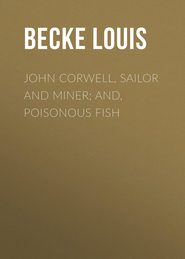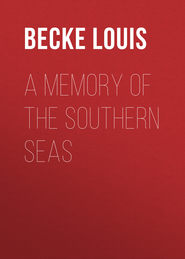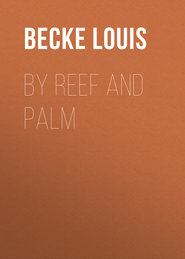По всем вопросам обращайтесь на: info@litportal.ru
(©) 2003-2024.
✖
"Chinkie's Flat"
Настройки чтения
Размер шрифта
Высота строк
Поля
“The poor little man looked at us in a dazed sort of a way—thought us lunatics, and then when old Char-tens asked him not to mind a bit of miners’ horseplay, but to sit down and have some fizz, he called him ‘an audacious ruffian,’ and shrieked out—
“‘I am Mr. B. D. Assheton—the manager of the Australian Insurance Company. Do you possibly imagine I would drink with a person like you?’”
Grainger laughed: “It must have been great fun.”
“Rather—but the cream of it is to come yet. He rushed oat into Flinders Street, found Sergeant Doyle and a policeman, and came back panting and furious, and pointing, to Charteris, told them to take him in charge. Doyle looked at us blankly, saw we were nearly dead with laughing, and then took Assheton aside, and said in his beautiful brogue—
“‘Me little mahn, it’s drinkin’ ye’ve been. Do yez want me to arrest the Po-liss Magisthrate himsilf? Who are ye at all, at all? Ye’d betther be after goin’ home and lyin’ down, or I’ll lock ye up for making a dishturbance. Do ye moind me now?’”
Grainger could no longer control his laughter, and in the midst of it, Myra tapped vigorously at the door, He rose and opened it.
“Whatever is all this noise about, Ted? You two great boys!”
“Oh, take Mallard away, Myra, for heaven’s sake!”
A little before eight o’clock the deafening clamour of a gong announced dinner, and the company filed in. Mrs. Trappème and the Misses Trappème were in “very much evening dress” as Sheila murmured to Myra, and they seemed somewhat surprised that neither Miss Grainger nor Miss Carolan had donned anything more unusual than perfectly-made dainty gowns of cool white Indian muslin. Grainger and Mallard wore the usual white duck suits (the most suitable and favoured dress for a climate like that of torrid North Queensland), and Sheila could not but admire their big well-set-up figures—both were “six feet men”—and contrast their handsome, bronzed and bearded faces with the insignificant appearance of Assheton and another gentleman in evening dress—a delicate but exceedingly gentlemanly young Scotsman. Of course there were more introductions—all of which were duly and unnecessarily carried out by Mrs. Trappème. Others of that lady’s guests were the local Episcopalian clergyman and his wife—the former was a placid, dreamy-looking, mild creature, with soft, kindly eyes. He smiled at everybody, was evidently in abject terror of his wife—a hard-featured lady about ten years his senior, with high cheek-bones and an exceedingly corrugated neck and shoulders. She eyed Myra and Sheila with cold dissatisfaction, and after dinner had once begun, devoted herself to the task of extracting information from the latter regarding her future movements. She had already discussed her with Mrs. Trappème, and had informed her hostess that she had “suspicions” about a girl who affected mystery in the slightest degree, and who could afford to pay six guineas a week for simple board and lodging.
“Quite so, Mrs. Wooler,” Mrs. Trappème had assented; “I must confess it doesn’t look quite right. Even Juliette thinks it very strange for her to be so reticent as to who she is and where she is going. Of course I could have refused to receive her, and am now rather sorry I did not. I understood from her that Mr. Grainger was an utter stranger to her—and I was quite surprised to see them all come in together as if they had known each other for years. Not quite correct, I think.”
“Mr. Grainger is very rich,” said the clergyman’s wife meditatively.
“Very,” said her friend, who knew that Mrs. Wooler meant to do a little begging (for church purposes) as soon as opportunity offered.
“It would be a pity for him to be involved with such a—a forward-looking young person,” she said charitably.
But for the first quarter of an hour she had no opportunity of satisfying her curiosity, for Sheila was quite hungry enough not to waste too much time in conversation. At last, however, a chance came, when Mr. Assheton said in his mincing voice—
“I believe, Miss Carolan, that like me, you are quite a new arrival in this country.”
“Oh, dear no! I have lived here ever since I was two years old.”
“Heah! in Townsville?”
“I meant Australia,” Sheila observed placidly.
“Then you are not an Australian born, Miss Carolan?” put in Mrs. Wooler with a peculiarly irritating condescension of manner and surprised tone, as if she meant to say, “I am sure you are—you certainly are not lady-like enough to be an English girl.”
“No, I am not,” was the reply. “Do you think you will like Queensland, Mr. Assheton?”
“I really have as yet formed no definite impression. Possibly I may in the end contrive to like it.”
“Do. It would be a great pity for the country if you did not,” said Sheila gravely, without moving an eyelid.
“Do you purpose making a long stay in Queensland, Miss Carolan?” pursued Mrs. Wooler.
“A very long one, perhaps—perhaps on the other hand a very short one. Or it may be that I may adopt a middle course, and do neither.”
Grainger, who was opposite, heard her, and as she looked across at him, he saw that she was “playing” her questioner and quite enjoying it.
Never for one moment did the clergyman’s wife dream that Sheila meant to be anything else but evasive, so she followed up. To her mind it was absolutely incredible that any woman would dare to snub her—Mrs. Wooler—daughter of a dean, and possessing an uncle who had on several occasions been spoken of by the Bishop of Dullington as his probable successor; such a thing was impossible!
“I presume, however, that your stay in Townsville itself will be short, Miss Carolan? You will find it a very expensive place—especially if you have no friends to whom you can go.”
Sheila’s face flushed. Her blood was getting up, and Myra looked at her nervously.
“Is there no ‘Girls’ Friendly Society,’ ‘Young Women’s Christian Association,’ or other kindred institution, where I could ‘be taken in and done for’?” she asked sweetly.
“Not as yet; but I am thinking of taking steps to found a Girls’ Friendly Society. Such an institution will soon be a necessity in a growing place like this.”
“How nice it would be for me to go there instead of staying at—at a boarding house!”
Juliette Trappème’s sallow face flushed with rage, and Mrs. Trappème, who saw that something was occurring, spoke loudly to Mr. Wooler, who answered in his usual soft voice. But Mallard, who was seated next to Miss Lilla Trappème, shot Sheila an encouraging glance.
“Quite so,” went on Mrs. Wooler. “I disapprove most strongly of any young woman incurring risks that can be avoided.”
“What risks?” and Sheila turned and looked steadily at Mrs. Wooler.
The sharp query somewhat upset the inquisitive lady, who hardly knew what she meant herself.
“Oh, the risks of getting into debt—living beyond one’s means—and things like that.”
“Oh, I see, madam,” and Sheila bowed gravely, although the danger signals were showing now on her cheeks. Then she added very clearly and distinctly, “That would be most dreadful to happen to any one, would it not, Mr. Assheton?”
“Oh, howwible—for a lady.”
“But,” she went on—and as she spoke she gazed so intently into Mrs. Wooler’s face that every one at the table saw her change colour—“but I am sure, Mrs. Wooler, that no girl could possibly come to such a sad condition while you are in Townsville, to give her the benefit of your years, your advice, and your experience—even though that advice was thrust upon her in a manner that I believe might possibly cause well-deserved resentment,” and then, with a scornful smile still on her lips, she turned to Mr. Assheton and asked him sweetly if he did not “think it was beginning to be very warm so early in the year?”
“By heavens!” mattered Mallard to Myra, “she has done the parson woman good. Look at her face. It’s unpleasant to look at.”
Mrs. Wooler’s features were a study. Unable to speak, and her hands trembling with rage, she gave the girl one glance of hatred, and then tried to eat; and Viveash, who had the sense to do so, at once began telling her some idiotic and pointless story about himself when he sang in a cathedral choir until his voice “failed him.”
Just then a long ring was heard at the front door, and the butler presently came to Mallard, and said—
“One of the reporters, sir, from the Champion wishes to see you. Most important, sir, he says. Will you please see him at once?”
Making his excuses, Mallard left the dining-room and went into one of the sitting-rooms, where the reporter was awaiting him.
CHAPTER X ~ THE “CHAMPION” ISSUES A “SPECIAL”
Ten minutes later Mallard was at the hall door giving instructions to the reporter.
“Hurry back as fast as you can, Winthrop, and tell Mr. Flynn to rash the special through. And as fast as any farther news come in rap out another. Get all the boys you can, and distribute the specials everywhere—anywhere. Chuck some over into the cemetery—they’ll make the dead ‘get up and holler.’ Tell the boys that they are not to make any charge—get the foreman to head it ‘Special! Gratis! (Any one newsboy who makes a charge for this special will be immediately dismissed.)’ See? And tell the boys they will get five shillings each extra in the morning. I’ll be down in another twenty minâtes or so. Go on, Winthrop, loop!”
Mr. Winthrop, who was as excited as Mallard himself, “looped,” and the editor returned to the dining-room with a galley-proof slip in his hand. Every one, of coarse, saw by his face that something had occurred.
“I won’t sit down again, Mrs. Trappème, if you and the other ladies will excuse me, for I have to hurry back to the office to attend to some important business. There is great news.” Then, bending down, he placed his hand on Grainger’s shoulder, and whispered, “You must come with me, old man. There is glorious news from Chinkie’s. I’ll tell you all about it in a minute, as soon as we are outside. Make your apologies and let us go,” and then going over to Mrs. Trappème, he handed her the proof to read to her guests and hurried out with Grainger, leaving every one in the room eager to learn what had occurred.
“Oh, dear me!” began Mrs. Lee-Trappème, adjusting her pince-nez, which always interfered with her sight.











